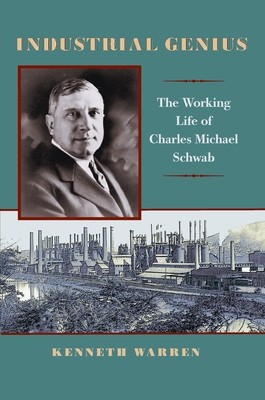
- We will send in 10–14 business days.
- Author: Kenneth Warren
- Publisher: University of Pittsburgh Press
- ISBN-10: 0822961997
- ISBN-13: 9780822961994
- Format: 15.5 x 23.4 x 2 cm, softcover
- Language: English
- SAVE -10% with code: EXTRA
Reviews
Description
Charles Schwab was known to his employees, business associates, and competitors as a congenial and charismatic person-a 'born salesman.' Yet Schwab was much more than a salesman-he was a captain of industry, a man who streamlined and economized the production of steel and ran the largest steelmaking conglomerate in the world. A self-made man, he became one of the wealthiest Americans during the Gilded Age, only to die penniless in 1939.
Schwab began his career as a stake driver at Andrew Carnegie's Edgar Thomson steel works in Pittsburgh at the age of seventeen. By thirty-five, he was president of Carnegie Steel. In 1901, he helped form the U.S. Steel Corporation, a company that produced well over half the nation's iron and steel. In 1904, Schwab left U.S. Steel to head Bethlehem Steel, which after twelve years under his leadership, became the second-largest steel producer in America. President Woodrow Wilson called on Schwab to head the Emergency Fleet Corporation to produce merchant ships for the transport of troops and materials abroad during World War I.
Kenneth Warren presents a compelling biography that chronicles the startling success of Schwab's business career, his leadership abilities, and his drive to advance steel-making technology and operations. Through extensive research and use of previously unpublished archival documentation, Warren offers a new perspective on the life of a monumental figure--a true visionary--in the industrial history of America.
EXTRA 10 % discount with code: EXTRA
The promotion ends in 18d.16:32:30
The discount code is valid when purchasing from 10 €. Discounts do not stack.
- Author: Kenneth Warren
- Publisher: University of Pittsburgh Press
- ISBN-10: 0822961997
- ISBN-13: 9780822961994
- Format: 15.5 x 23.4 x 2 cm, softcover
- Language: English English
Charles Schwab was known to his employees, business associates, and competitors as a congenial and charismatic person-a 'born salesman.' Yet Schwab was much more than a salesman-he was a captain of industry, a man who streamlined and economized the production of steel and ran the largest steelmaking conglomerate in the world. A self-made man, he became one of the wealthiest Americans during the Gilded Age, only to die penniless in 1939.
Schwab began his career as a stake driver at Andrew Carnegie's Edgar Thomson steel works in Pittsburgh at the age of seventeen. By thirty-five, he was president of Carnegie Steel. In 1901, he helped form the U.S. Steel Corporation, a company that produced well over half the nation's iron and steel. In 1904, Schwab left U.S. Steel to head Bethlehem Steel, which after twelve years under his leadership, became the second-largest steel producer in America. President Woodrow Wilson called on Schwab to head the Emergency Fleet Corporation to produce merchant ships for the transport of troops and materials abroad during World War I.
Kenneth Warren presents a compelling biography that chronicles the startling success of Schwab's business career, his leadership abilities, and his drive to advance steel-making technology and operations. Through extensive research and use of previously unpublished archival documentation, Warren offers a new perspective on the life of a monumental figure--a true visionary--in the industrial history of America.


Reviews